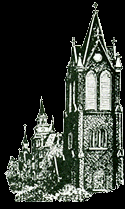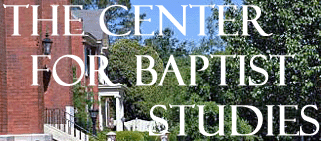|
Encouraging scholarship, strengthening faith identity, and interpreting contemporary issues in Baptist life. |
||
 |
|
Resources: |
|
Home ē Staff ē Local Church ē News & Views ē Issues ē Bulletin ē Conferences / Seminars ē Sabbaticals ē Certificate ē Links |
||
|
John Russel, "A Brief Narrative...of a Church of Christ in Gospel Order in Boston" by Walter B. Shurden Callaway Professor of Christianity Executive Director, The Center for Baptist Studies Mercer University, Macon, Georgia They wanted to know, these Puritans of Massachusetts in 1679, what on earth had provoked the Lord of Heaven to bring such hellish judgments on the Holy Commonwealth. Not far into the inquiry they named the enemies. Quakers and Baptists! Provocateurs of Heaven! Stubborn, cussed dissenters! The Puritan Establishment accused Quakers and Baptists of subverting the civil and spiritual harmony of New England! Deliberately, premeditatively, with full awareness of intent, Quakers and Baptists set out to destroy both state and church, whined the Congregationalist Puritans. Quakers were "false worshippers." And Baptists, in establishing their churches alongside Puritan churches, had "set up an altar against the Lordís altar." Baptists responded! In 1680 John Russel, second pastor of the First Baptist Church of Boston, released an apologetic. It was courteous in spirit, catholic in tone, but clear in content. Russel defended Baptists against "scandalous things"--being schismatics, embracing immoral persons, disturbing the peace, undermining true churches, neglecting public worship, engaging in idolatry, and acting subversive of civil government. Nathan Wood, a later pastor of the church, labeled Russelís work "the first piece of Baptist literature of distinctly American origin." Moreover, First Baptist Church of Boston, founded in 1665, was "the only Baptist church in America whose records of the seventeenth century have been preserved." One can justifiably acclaim Russelís little work a Baptist classic, a very important one at that. What can we learn from Russel about some of the earliest Baptists in America? What questions can Russelís 1680 defense of Boston Baptists help us answer? Question one: how did these seventeenth-century Baptists understand themselves? Unlike some later Baptists who claim denominational superiority by saying that "Baptists are not Protestants," these early Baptist ancestors of ours, as indicated by the preface written by some prominent English Baptists, had no problem whatsoever identifying themselves as "Protestant". These Boston Baptists began with what we would call today "an ecumenical spirit." Accused of "undermining" the churches of Massachusetts, Baptists countered that they "heartily desire and daily pray for the well being, flourishing, and Prosperity of all the Churches of Christ...and desire that ourselves may have a peaceable living by them, as Christians." Rather than trying to "destroy" the Puritan churches, Baptists maintained, with interestingly euphemistic language, that they were only trying "to reduce them to a nearer conformity to the will of Christ." Baptists argued that there was a great difference in "Reduction and Destruction." But, understandably, the Puritans missed the point. What Baptists called "reduction" appeared to be "destruction" to the Congregationalists. The Baptists of Boston, however, did not think, as some accused, that only immersed believers were Christians. Rather they judged "that the Lord hath many precious People in the World that are not baptized, according to or in the manner that we Baptize." While viewing infant baptism "as nothing or a nullity," these Baptists never denied the Congregationalists "to be Churches of Christ." Baptists and Congregationalists were one, said the Baptists, "in all the main points of religion." Question two: what was the origin of these Boston Baptists? Were they transplanted Baptists from England? Were they related to the Anabaptists? Did they come out of New England Puritan Congregationalism? The composition of the membership of the church at Boston tells us much about the origins of Baptists in this country. Former New England Congregationalists, such as Thomas Gould and Thomas Osborne, became Baptists and spearheaded the founding of the church at Boston. This same pattern of Congregationalists-turned-Baptists had manifested itself in Roger Williams and the First Baptist Church of Providence and John Clarke and the First Baptist Church of Newport. The earliest Baptist leadership in this country, with few exceptions, was not transplanted from English Baptists, and they certainly did not begin with Anabaptists. Rather they came out of The Church of Englandís Congregational and Puritan wings in New England. Isaac Backus, careful Baptist historian of the eighteenth-century, certainly had little doubt as to the origin of seventeenth century New England Baptists. In the opening line of his massive history of New England Baptists, Backus said, "To obtain clear and just ideas of the affairs of the Baptists in New England, it seems necessary for us to look back to its first settlement, and carefully to examine what were the sentiments and character of the original planters." He also said of the Baptists, "In general, their faith and practice come the nearest to that of the first planter of New England, of any churches now in the land, excepting in the single article of sprinkling infants." McLoughlin followed Backusís interpretation regarding Baptist origins in New England when he said,"Most Baptists started as good Calvinistic members of the Puritan congregations." But this was not the complete story of First Baptist Church in Boston. The church also contained from the beginning three Baptist families, recently emigrated to the colonies from England. These three families indeed may have spurred Thomas Gould to break with the Congregationalists and proceed with the establishment of the Baptist church at Boston. Moreover, a couple of families, members of no previous churches, aligned themselves with First Baptist Church, Boston. Question three: were these Baptists really religious schismatics who sought to undo the authority of the state? Though accused of separating from the Congregational churches of Massachusetts, most of the early Baptists were actually "excluded" from those churches. Baptists affirmed their willingness to stay in Congregational churches, but the Puritans would not grant these would-be non-Separating Baptists the freedom to object to infant baptism. So Baptists left Puritan Congregationalism "not for any sinful Distemper of Discontent, or because they were weary of the Yoke of Christ," but "out of tenderness of Conscience." Baptists voluntarily gathered themselves into a church, but they took that action reluctantly. Thomas Gould, first pastor of the Baptists of Boston, for example, had remained within New England Congregationalism seven or eight years after first objecting to infant baptism. His only major difference with the Congregationalists was his refusal to have his child sprinkled. Later, after he became convinced of immersion as the proper mode of baptism, he and other like-minded persons gathered "themselves into a Church-state." Though accused of being "enemies to the Civil Goverernment," Baptists pledged that both their "Persons and Estates were always ready at command to be serviceble in the defence of the ... Country." Rather than being the chief cause of the judgment of God on the land, Baptists proved their innocence by pointing to the fact that they did not lose a single person to smallpox! Question four: to what authority did these early Baptists appeal? They appealed to multiple authorities: scripture, individual conscience, and the local body of believers. They believed the Bible to be basic in their search for being obedient to the will of God. If they could not find warrant in Scripture, as they could not for infant baptism, they would disregard the practice for adult baptism. These early Baptists also acknowledged the authority of individual conscience under Holy Scripture as a fundamental source of religious guidance. The Congregationalists accused Baptists of scandal because Baptists accepted Thomas Foster into their membership. Foster had been barred from communion in a Congregational church. Baptists responded that Fosterís only "crime" against the Congregationalists was dissenting from the practice of infant baptism. Moreover, he rejected infant baptism because he could not see "any light from the Word of God for it." While the Congregationalists placed Foster under "Admonition," barred him from communion, and demanded repentance, Foster became a member of the Baptist church because he could see "no hope of reconciliation, unless he would act against his own Conscience." Baptists, of course, approved of Fosterís interpretation of scripture, honored his conscience, and, therefore, admitted him into their fellowship. Baptists also made it clear that the local body of believers exercised authority. They were serious about guarding the purity of their churchís membership. On one occasion, the church confessed their error of admitting one man to their membership who had left a Congregational church with an unchristian spirit. The Baptists labored to convince the man of his wrong, barring him from their own celebration of the Lordís Supper. When he admitted his wrong both to the Baptists and his former Congregationalists, he was restored to full fellowship in the Baptist congregation. Question five: what do we know about the early worship and ministerial leadership of these seventeenth-century Baptists of Boston? We know that Thomas Gould, a layman, was called to be the first pastor. One of the dozen wealthiest men in the town of Charlestown, Massachusetts, Gould gives the lie to the caricature of early Baptists as being from the dregs of society. A man of some prominence, he appeared to be somewhat close friends with the prestigious Winthrop family of New England. It is true, however, that Gould was not educated for the ministry. Old uppity Harvard graduate and soon to be Harvard president, Increase Mather, charged the unpretentious Baptists of Boston with the sin of Jeroboam, of "making the lowest people Priests." And the Baptists understood Matherís reference perfectly. They readily confessed that "our evil in this prospect, is our calling to office, those who have not bin bred up in Colledges, and taught in other tongues, but have bin bred up to other callings but it is not because we are against Learning, for we do esteem it, and honor it in its place." Moreover, if educated types who were "otherwise duly qualified" had been available, Baptists insisted they would have gladly used them. But then in a candid afterthought, Baptists said: "But we do not think that the Spirit of God is locked up within the narrow limits of Colledge-Learning, that there are none fit to be called to office in a Church but such, nor that all such are fit for such a Work, be they never so great Scholars; neither doe we think that all those that have not that Learning, are to be accounted the lowest of the People." Regarding their worship, the Baptists defended themselves against the charge of being a disorderly church. They gladly claimed that they met on "the first day of the week," an effort no doubt to distinguish themselves from Seventh Day Baptists. They worshiped publicly rather than secretly, but they often did so in private homes. On one occasion they met "in the open air on a very cold day" because the doors of their church building had been nailed up by civil authorities. They reverently referred to the Lordís Supper as "the holy Ordinances of Christ" and "Communion." They apparently observed the rite every Sunday at the hands of duly elected and ordained officers of the church. Lambasted for forming their own church and
following their own consciences, the Baptists were also accused of being
"idolaters" and rebels against legitimate authority. The Baptists of
Boston responded "that what we have done is not in rebellion nor
transgression to turn from following the Lord or worshipping him according
to his own appointments, but that we may with more freedom of spirit
worship the Lord together in purity." Freedom of spirit! They needed it in
the seventeenth century and we need it the twenty-first century. And we
need it for the same reason they needed it. To worship the Lord together
in purity! The Puritans are gone. What now are the obstacles to our
freedom of spirit? |
||
|
The Center for Baptist Studies, Mercer University, 1400 Coleman Avenue, Macon, GA 31207 Phone (478) 301-5457 |
||
